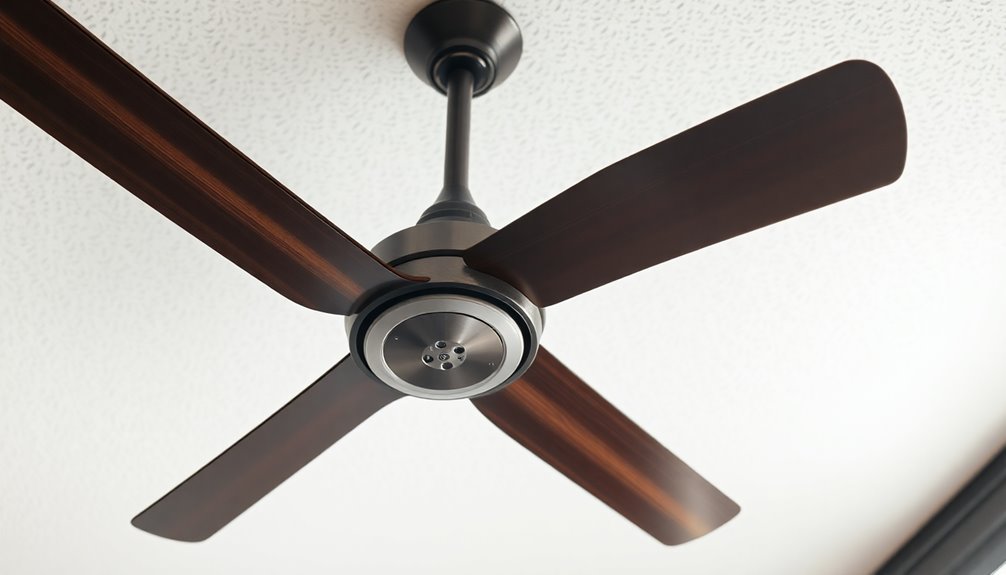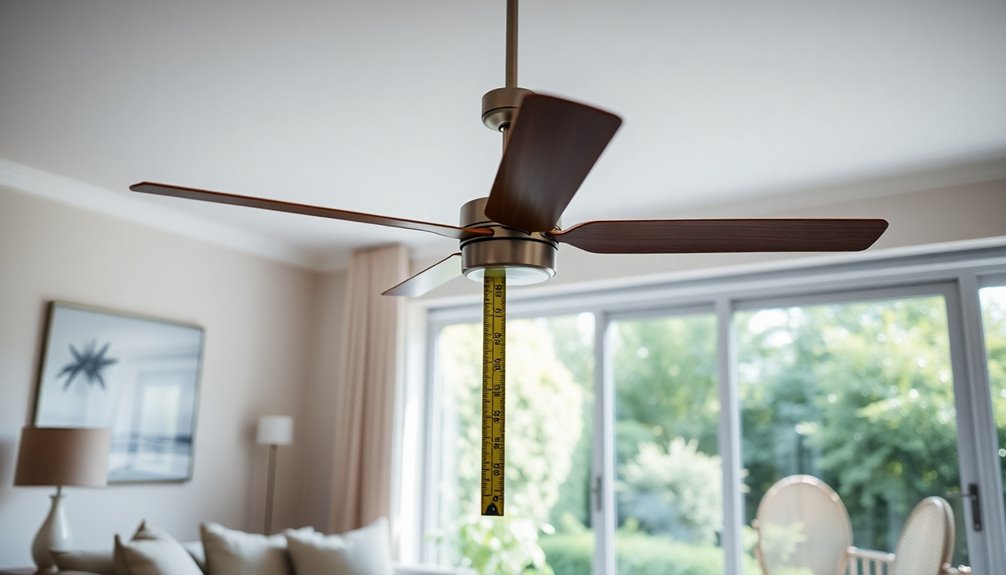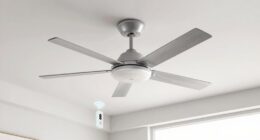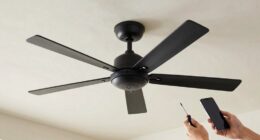If your ceiling fan is making a humming noise, it could be due to several common issues. An overheating motor, loose wiring, or incorrect bulb wattage might be the culprit. Check the compatibility of your dimmer switch, as mismatched voltage can lead to humming too. Also, inspect the fan for loose components or damaged blades, which can create vibrations. Regular maintenance is key, like cleaning dust off the blades and ensuring all connections are secure. By addressing these factors, you can reduce the noise. Want to explore more solutions to quiet down that fan?
Key Takeaways
- Overheating fan motors or incorrect wattage bulbs can create persistent humming noises in ceiling fans.
- Loose wiring connections or improper installation can lead to electrical fluctuations and amplify humming sounds.
- Incompatible dimmer switches or malfunctioning remote receivers may contribute to increased humming noise levels.
- Dust and dirt accumulation on fan blades can hinder performance and result in louder operation.
- Regular maintenance, including tightening screws and cleaning, can significantly reduce humming and improve fan efficiency.
Common Causes of Humming Noises

If you've noticed a humming noise coming from your ceiling fan, it's often a sign of underlying issues that need addressing.
One common cause could be an overheating fan motor. If the motor's not functioning properly due to mechanical defects, it might produce a persistent humming sound.
Another source of this noise could be your light bulbs. Using incorrect wattage bulbs can create a mismatch with the fan's electrical specifications, leading to a buzzing or humming noise.
Additionally, if your fan is improperly installed, it mightn't operate efficiently, causing unnecessary vibrations and sounds.
Loose or damaged wiring connections can also contribute to that annoying humming noise. If the wiring isn't secure, it can lead to electrical fluctuations, which may affect the fan's performance.
Finally, if you've installed variable speed controls that aren't designed for ceiling fans, you might experience humming during operation.
Identifying Electrical Issues

If your ceiling fan's humming noise persists, it might be time to check for electrical issues.
You should look into dimmer switch compatibility and make sure it's suitable for your fan.
Additionally, inspecting the wiring can help identify any loose connections or damage that could be causing the noise.
Common Electrical Problems
Ceiling fans often hum, and this persistent noise can signal underlying electrical problems that need your attention. The humming noise could stem from issues with the motor or wiring. If left unaddressed, these electrical issues can lead to overheating or further malfunction.
Start by checking all electrical connections, including those at the circuit breaker. Loose connections can amplify the humming noise, so tightening them may resolve the issue.
Another common culprit is incorrect wattage light bulbs. Using bulbs that aren't compatible with your fan's electrical system can create additional humming sounds.
If you're using a remote to operate your fan, a malfunctioning remote receiver might be the source of the buzzing you hear. It's important to verify that any dimmer switches you're using are designed for fan operation, as improper dimmers can cause voltage fluctuations, leading to an audible humming noise.
Dimmer Switch Compatibility
When it comes to ceiling fan humming, dimmer switch compatibility can play a considerable role in the noise you experience. Many dimmer switches aren't designed for ceiling fan operations, which can lead to unwanted humming sounds.
If your fan's making noise, here are a few points to take into account:
- Incompatible Voltage: Dimmer switches can cause voltage changes that may lead to humming noises.
- Standard Switches: Switching to a standard ON/OFF switch can enhance your fan's performance and minimize electrical noise.
- Nighttime Noise: Humming is often more pronounced at night, especially if your fan is controlled by a dimmer switch.
- Overheating Risks: Using a dimmer can lead to buzzing sounds or overheating, suggesting it's time to replace it with proper speed controls.
Identifying and replacing faulty dimmer switches can greatly reduce or even eliminate the noise your ceiling fan is making.
If you suspect your dimmer switch is causing issues, take into account making the switch to a compatible option to enjoy a quieter and more efficient ceiling fan experience.
Wiring Inspection Necessity
Regularly inspecting the wiring in your ceiling fan is essential for identifying electrical issues that may cause humming noises. A persistent hum often indicates loose or damaged connections, which can lead to further complications if not addressed. During your wiring inspection, look for any frayed wires or improper connections.
Additionally, check your dimmer switch and control systems, as faulty components can create voltage fluctuations, resulting in that annoying hum. Using a voltage tester can help guarantee your fan receives the correct voltage, allowing you to diagnose any electrical problems linked to the noise.
Don't underestimate the importance of regular checks; overheating wires can pose safety risks and contribute to the hum. If you notice any irregularities during your inspection or if the humming persists after your efforts, it's best to consult a professional electrician.
They can safely address deeper electrical faults that may be beyond your expertise. By taking these proactive steps, you can't only reduce the humming but also guarantee your ceiling fan operates safely and efficiently.
Inspecting the Fan Motor

To effectively address a humming noise from your ceiling fan, start by inspecting the fan motor. This is often where the issue originates, so a careful examination is crucial. Look for any visible signs of wear, as these can indicate malfunction.
Follow these steps to inspect the fan motor:
- Check the motor housing: Look for discoloration or burnt components that may suggest overheating or damage.
- Examine for loose mounting: Verify the motor is securely mounted; loose mounting can cause vibrations, amplifying the humming sound.
- Listen for unusual noises: Pay attention to any grinding or rattling, which can indicate poor lubrication or internal issues.
- Inspect for signs of wear: Look for frayed wires or other visible signs that the motor might need replacement.
Regular maintenance, including cleaning and lubricating the motor, can help reduce humming noises and extend your fan's lifespan.
Checking Wiring Connections

After inspecting the fan motor, the next step is to check the wiring connections. Start by examining the junction box where the fan is mounted. Make certain all connections are securely fastened; loose wiring can lead to electrical noise, including a persistent hum.
Look for any signs of wear or damage on the wires, such as fraying or melting. These issues can considerably affect conductivity and contribute to the humming sounds you're hearing.
Next, ascertain the wires are connected according to the manufacturer's wiring diagram. Incorrect connections can create electrical problems and lead to the noise you're experiencing.
It's also wise to use a voltage tester to check that the power supply is stable. Any fluctuations in power can result in a humming fan.
If you've gone through these steps and the humming persists, it might be time to consult customer support or a licensed electrician. They can perform a thorough inspection and address any underlying electrical faults that could be causing the issue.
Taking these precautions can help you enjoy a quieter ceiling fan!
Examining Remote Controls

Often, ceiling fans equipped with remote controls can hum due to issues with their receivers. If you notice a humming noise, it's crucial to investigate the remote and its compatibility with your fan.
Here are some common reasons for the noise:
- Faulty Receiver: If the humming stops when you connect the fan directly to the power source, the receiver might be malfunctioning.
- Incompatible Systems: A remote control that doesn't match your fan's specifications can lead to operational issues, including unwanted humming.
- Improper Pairing: Confirm that the remote control and receiver are correctly paired. Misalignment can cause interference, leading to noise.
- Replacement Needs: If you suspect a faulty receiver or remote control, replacing them with compatible models can help eliminate the humming noise and restore normal functionality.
Resolving Loose Components

Remote control issues can lead to various problems, but another common culprit behind a ceiling fan's humming noise is loose components.
When screws and bolts aren't tightened properly, they can create vibrations as the fan operates, especially at higher speeds. You should regularly inspect all screws, focusing on those securing the fan blades and light fixtures. If you notice any loose blades, it's essential to tighten them, as this can greatly reduce vibrations and eliminate the annoying humming noise.
Additionally, make certain the blade holders are firmly attached to the motor. Any looseness here can cause increased movement, exacerbating the humming sound.
Don't overlook the mounting bracket; if it's loose or improperly installed, it can lead to unwanted vibrations as well.
Conducting routine maintenance checks helps guarantee all components are secure and well-aligned. By taking these steps, you'll not only resolve loose components but also enjoy a quieter and more efficient ceiling fan.
Maintenance Tips for Fans

To keep your ceiling fan running smoothly and quietly, regular maintenance is key. By following these maintenance tips, you can reduce common noises and even fix a noisy ceiling fan:
- Clean the fan blades: Dust buildup can affect performance and increase noise levels. Wipe the blades regularly to maintain efficiency.
- Tighten screws and bolts: Loose components can lead to vibrations and humming noises. Check all connections and tighten them as needed.
- Lubricate the bearings: Follow the manufacturer's instructions to lubricate the bearings. This minimizes friction and helps prevent grinding or squeaking sounds.
- Inspect installation: Verify your fan is properly aligned and balanced. An imbalanced fan can create excess noise during operation, so adjust it as necessary.
Frequently Asked Questions
How Do I Stop My Ceiling Fan From Humming?
To stop your ceiling fan from humming, start by checking the wiring and motor for loose connections.
If you've got a dimmer switch, replace it with a standard ON/OFF switch, as dimmers can cause issues.
Make sure the fan blades are securely attached and properly aligned.
Lubricate the motor and bearings as needed, and test the fan at different speed settings to see if the humming changes.
Is It Normal for a Fan to Make a Humming Noise?
Picture a gentle breeze on a summer night; that's the soothing sound a fan provides.
It's normal for a fan to hum, especially when it's running at lower speeds. This low hum often stems from the motor's vibrations.
However, if the humming turns persistent or loud, it might indicate something's off. Trust your instincts—if it feels wrong, it's wise to check for loose wires or incompatible controls.
Your safety's worth it!
Can You Lubricate a Ceiling Fan Without Taking It Apart?
Yes, you can lubricate a ceiling fan without taking it apart!
Just locate the motor's oil ports, usually on top of the motor housing.
Make sure the fan's off and unplugged before you start.
Apply a few drops of lightweight machine oil or a specific fan lubricant to avoid dust buildup.
This simple maintenance task can help improve performance and reduce noise, keeping your fan running smoothly for years.
What Does It Mean When Your Ceiling Fan Starts Making Noise?
When your ceiling fan starts making noise, it's like it's trying to whisper secrets you can't quite hear. This could mean a few things, like loose screws or an electrical hiccup.
Sometimes, it's just a simple issue, like a dimmer switch that isn't quite right. Regular checks and maintenance can help keep your fan singing smoothly instead of grumbling.
Don't ignore those sounds; they might be your fan's way of asking for attention.
Conclusion
To sum up, if your ceiling fan's humming noise persists, don't ignore it. Explore the common causes, check the wiring, and inspect the motor—every detail matters. The solution might be simpler than you think, or it could reveal deeper electrical issues. Don't let the hum linger; take action now, and you could uncover the mystery behind the noise. Your fan's tranquility awaits, but only if you're willing to investigate—so what will you discover?









